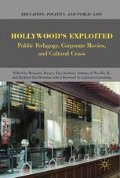Abstract
Does Hollywood exploit people with disabilities? This is a loaded question, pregnant with polyvalent responses. On the one hand, it is safe to assume the employers within the corporate cinema globally known as Hollywood adhere to all the liberal laws that are put in place to protect people with mental and physical disabilities. On the other hand, representation of people with mental and physical disabilities seems to be highly problematic, given the number of films that are produced, which either get entertainment value out of dramatizing the disability of the characters and/or exoticizing them to get an emotional rise out of the audiences. In short, what unites most Hollywood narratives that have the disabled either as central characters or minor players is its exploitation of people with disabilities, using them as a means to move the plot.
Check it out. Dustin Hoffman, “Rain Man,” look retarded, act retarded, not retarded. Counted toothpicks, cheated cards. Autistic, sho’. Not retarded. You know Tom Hanks, “Forrest Gump.” Slow, yes. Retarded, maybe. Braces on his legs. But he charmed the pants off Nixon and won a ping-pong competition. That ain’t retarded. Peter Sellers, “Being There.” Infantile, yes. Retarded, no. You went full retard, man. Never go full retard. You don’t buy that? Ask Sean Penn, 2001, “I Am Sam.” Remember? Went full retard, went home empty handed.
Kirk Lazarus (played by Robert Downey Jr.) in the film Tropic Thunder (2008)
Access this chapter
Tax calculation will be finalised at checkout
Purchases are for personal use only
Preview
Unable to display preview. Download preview PDF.
References
Allen, R. C. & Gomery, D. (1985). Film history: Theory and practice. New York, NY: Knopf.
Armstrong, F., Armstrong, D., & Barton, L. (2000). Inclusive education: Policy, contexts and comparative perspectives. London, UK: David Fulton Publishers.
Davis, L. (1997). The disability studies reader. New York, NY: Routledge Press.
Denzin, N. K. (1991). Images of postmodern society: social theory and contemporary cinema. Thousand Oaks, CA: Sage.
Foucault, M. (1980). Tower/knowledge (C. Gordon, Trans.). New York: Pantheon.
Giroux, H. A. (1988). Teachers as intellectuals: Toward a critical pedagogy of learning. New York, NY: Bergin & Garvey.
Giroux, H. A. (2002). Breaking in to the movies: Film and the culture of politics. New York: Blackwell.
Giroux, H. A., & Giroux, S. S. (2006). Take back higher education: Race, youth, and the crisis of democracy in the post-civil rights era. New York: Palgrave MacMillan.
Gramsci, A. (1989). Selections from the prison notebooks (10th ed.). New York, NY: International Publishers.
Greenberg, E. S. & Page, B. I. (2003). The struggle for democracy. New York, NY: Longman.
Kashani, T. (2007). Dissident cinema: Defying the logic of globalization. In J. Harris & V. Seizys (eds.), Contested terrains of globalization (pp. 241 –254). Chicago, IL: Changemaker Press.
Kashani, T. (2009). Deconstructing the mystique: An introduction to cinema. Dubuque, IA: Kendall/Hunt.
Linton, S. (1998). Claiming disability. Knowledge and identity. New York: New York University Press.
Marcuse, H. (1969). An essay on liberation. Boston, MA: Beacon Press.
Nocella, II, A. J. (2008). Emergence of disability pedagogy. Journal for Critical Education Policy Studies. Volume 6, Number 2.
Nocella, II, A. J., Best, S., and McLaren, P. (2010). Academic repression: Reflections from the Academic Industrial Complex. Oakland, CA: AK Press.
Olson, K. (Thursday, May 31, 2007). “Movie review: Tiptoes.” The gimp parade. http://thegimpparade.blogspot.com/2007/05/movie-review-tiptoes.html.
Taylor, S. (1996). Disability studies and mental retardation. Disability Studies Quarterly. Vol. 16, No. 3.
Editor information
Copyright information
© 2010 Benjamin Frymer, Tony Kashani, Anthony J. Nocella II, and Rich Van Heertum
About this chapter
Cite this chapter
Kashani, T., Nocella, A.J. (2010). Hollywood’s Cinema of Ableism: A Disability Studies Perspective on the Hollywood Industrial Complex. In: Frymer, B., Kashani, T., Nocella, A.J., Van Heertum, R. (eds) Hollywood’s Exploited. Education, Politics, and Public Life. Palgrave Macmillan, New York. https://doi.org/10.1057/9780230117426_7
Download citation
DOI: https://doi.org/10.1057/9780230117426_7
Publisher Name: Palgrave Macmillan, New York
Print ISBN: 978-0-230-62199-2
Online ISBN: 978-0-230-11742-6
eBook Packages: Palgrave Media & Culture CollectionLiterature, Cultural and Media Studies (R0)

